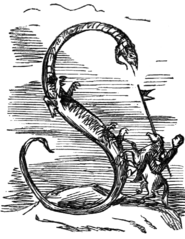CHAPTER XXIV
IN WHICH MR. OSBORNE TAKES DOWN THE FAMILY BIBLE.
The Captain, with a half-guilty secret to confess, and with the prospect of a painful and stormy interview before him, entered Mr. Osborne's offices with a most dismal countenance and abashed gait, and, passing through the outer room where Mr. Chopper presided, was greeted by that functionary from his desk with a waggish air which farther discomfited him. Mr. Chopper winked and nodded and pointed his pen towards his patron's door, and said, "You'll find the governor all right," with the most provoking good humour.
Osborne rose too, and shook him heartily by the hand, and said, "How do, my dear boy?" with a cordiality that made poor George's ambassador feel doubly guilty. His hand lay as if dead in the old gentleman's grasp. He felt that he, Dobbin, was more or less the cause of all that had happened. It was he had brought back George to Amelia; it was he had applauded, encouraged, transacted almost the marriage which he was come to reveal to George's father: and the latter was receiving him with smiles of welcome; patting him on the shoulder, and calling him "Dobbin, my dear boy." The envoy had indeed good reason to hang his head.
Osborne fully believed that Dobbin had come to announce his son's surrender. Mr. Chopper and his principal were talking over the matter between George and his father, at the very moment when Dobbin's

